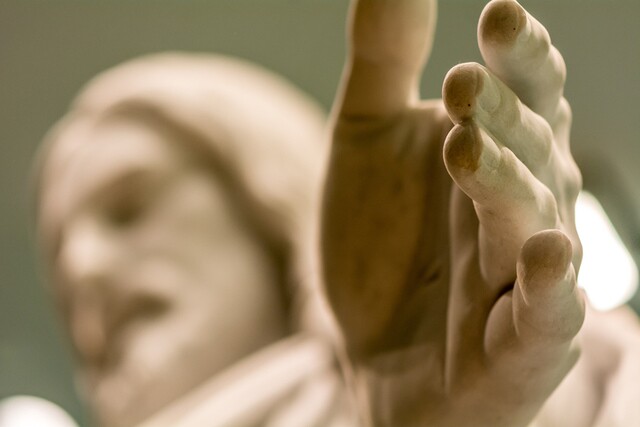Our baptismal covenant requires us to stand as witnesses of Christ at all times and in all places. What better way for us to represent our belief in Christ than to live and act as He would?
As his followers, we cannot do a mean or shoddy or ungracious thing without tarnishing his image. Nor can we do a good and gracious and generous act without burnishing more brightly the symbol of him whose name we have taken upon ourselves.
If living a Christlike life demonstrates our devotion to Christ’s gospel and the morals and teachings he gave us, then what does it say about us when we are unkind to others in our words or deeds? What are we really saying about our beliefs when we engage in lewd entertainment or dishonest activities? How Christlike are we when we turn away the needy because we judge them as unworthy of our loving acceptance or reject the homeless or refugee because we refuse to put our trust in Christ and give without question or reservation?
Absolutely basic to our faith is our testimony of Jesus Christ as the Son of God. … He is the chief cornerstone of the church which bears His name.
There are many reasons to be a member of The Church of Jesus Christ of Latter-day Saints. The Church itself does much good, such as sending relief to the victims of disasters all over the world. The members of the church, as a whole, are known for being generous in their communities. They have strong family values. There are many good things we can say about the members of the LDS church.
But all those things don’t make us any different from any other social institution that does good in the community. There are many who contribute to victims of disasters, who are generous in their communities, and who advocate for strong family values.
What makes us different (or should make us different) is our commitment to doing these things because of our devotion to Christ, in whose name we perform these acts. Living a life centered on the teachings and values given to us by the Son of God is what the gospel is all about. It isn’t about being seen of men as being nice to others, it is about demonstrating our commitment to following the teachings given to us by Him who redeemed our souls from eternal destruction. As much as anything we should be good and follow Christ’s gospel out of a profound sense of gratitude.
Mortal ministry
Because we have such difficulty wrapping our less capable minds around the magnitude of the man we call Christ or Jesus, we often tend to assume that his life was unremarkable before he started his mortal ministry. All the scriptures tell us is that he grew in favor with God and man. That’s not much information to go on.
We know that before starting his mortal ministry he fasted and prayed for 40 days. At the end of that time, he was tempted of the devil. Do we really believe that in his whole life he only experience those three specific temptations? Are any of us so lucky that we would be given only one formal setting in which to prove our commitment to God?
It is my personal belief that just as each of us is tempted and tried according to our personal abilities and limits, so too was Jesus tempted. If there was a sense of urgency among the armies of Lucifer to cause any one person to slip up and fail, it would have been with Jesus. He was the kingpin, the key to everyone’s salvation.
Satan would have exercised every opportunity to lure Jesus into desiring to do a selfish or self-serving thing, to feel picked upon or offended, to feel indignant about an injustice. It could have been any of a thousand things. Satan only had to succeed once in order to foil the Father’s plan and dethrone His beloved Son.
Resurrection
Sometimes we marvel that Christ’s apostles and disciples had such a difficult time understanding his teachings. Having been born and raised with the concept that man can come back from the dead and receive an immortal body that is glorified, we wonder what their problem was with this concept.
We forget that they had never seen anyone be resurrected before. It hadn’t ever happened. They had been raised under a different law than that which Jesus instituted. AND they did not have the gift of the Holy Ghost until well after his resurrection. They had witnesses from the Holy Ghost, but they had an inferior knowledge about the things he taught them until the Holy Ghost was their constant companion and burned that knowledge into their souls with living fire.
This is the advantage we have today. We have the gift of the Holy Ghost to teach us, convert us, and walk with us all the days of our lives.
Section 2—What do we believe?
It is one thing for us to join in with the rest of the Christian world and celebrate each Easter and retell the stories of the resurrection. It is quite another thing to answer President Hinckley’s question: “Do you actually believe it?”
The whole Christian world believes (at least they used to) that Jesus rose from the dead, but no one else but us believes that same resurrection opened the door for each and every one of us to also be resurrected and receive a glorified body of flesh and bone. That doctrine is unique to us.
If we truly believe that not only Christ rose from the dead, but that each of us will also rise from the dead and live forever as immortal souls, what differences would or should that make in how we live every day of our lives?
If we rightfully ascribe to Christ his divine station as the Son of God, and we truly want to be His disciples so we can become like him then there are some things we must do. President Hinckley says it is our responsibility to Read the scriptures, Serve our fellowmen, and Pray to our Father in Christ’s name.
As we study the scriptures, serve in the Church and in our homes and communities, and pray to our Father in Heaven, we open the door for communication between us and the heavens themselves. The Holy Ghost will guide and direct us back home to our eternal parents. That is the whole purpose of mortality, to prove ourselves faithful so we can return home victorious and be crowned with eternal glory forever more.
Sections 3 & 4—What shall we do?
Jesus is not just someone we happen to believe in. He is the one after whom we need to be patterning our lives. Our goals and aspirations in life need to include how we can better be like Him. Our worship of God, our Father, and our obedience to his Son, the Christ is not a belief of convenience, but a belief that needs to define who we are, how we live, and what we hope for in the eternities. Our relationship with Christ and what he represents needs to be an all-consuming part of our lives.
Lead photo from Getty Images


